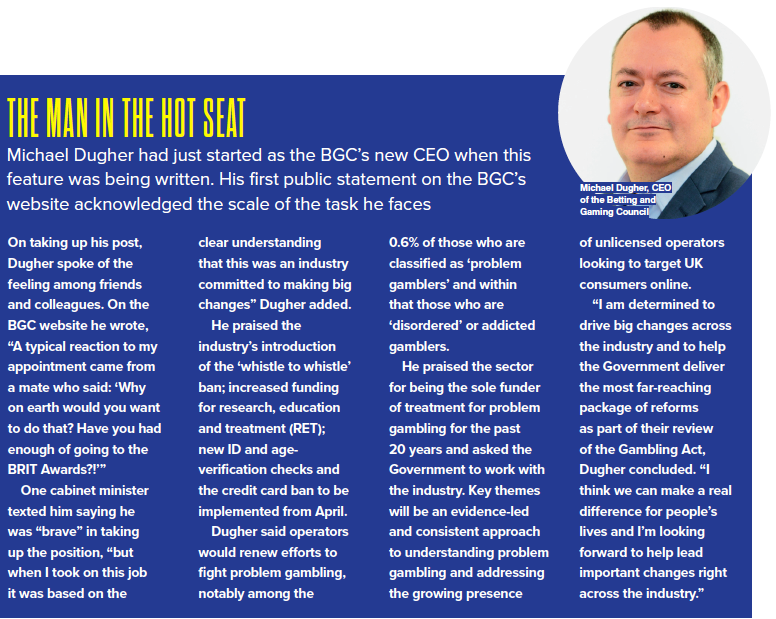Green shoots?

The Betting and Gaming Council has faced a baptism of fire, having to contend with a number of negative headlines even before permanent chief executive Michael Dugher started his role. Jake Pollard reports on the trade body’s turbulent first few months
The Betting and Gaming Council (BGC) has had a busy start to life as the new trade body for the online gambling industry.
Formed through the merger of the Association of British Bookmakers and the Remote Gambling Association, its chair Brigid Simmonds – chief executive Michael Dugher started on 3 February – had barely moved into her new office before she was having to respond urgently to criticism of the industry’s practices in articles published by the Guardian, Daily Mail and other major press outlets.
If critical articles aimed at the industry were nothing new, the BGC’s response, as the new public face of the UK gambling sector, would be watched closely.
At this point in time it is too early to opine on whether the BGC has or hasn’t got the tone right, and it isn’t the point of this article.
Having said that, there is no denying that the tenor of its responses to those stories has been much more conciliatory than anything that might have been put out by its predecessors the ABB and RGA – even if the latter always operated differently to the former.
The opportunities for BGC statements have been numerous in recent weeks. The contributions from chair Simmonds or CEO Dugher at forthcoming hearings, press conferences, events and in further press articles will be heavily scrutinised.
 Simmonds (left) tells iGB that she has always been “a great believer in working with government, [but] there is no point making demands or saying ‘we want this’ or ‘we want that’.
Simmonds (left) tells iGB that she has always been “a great believer in working with government, [but] there is no point making demands or saying ‘we want this’ or ‘we want that’.
“We know we have to be best in class and that we haven’t behaved as well as we might have done,” she explains. “The whole tenure of the BGC is about raising standards and acknowledging that we need to do more and do it better.”
Such comments are in stark contrast to the way the ABB responded to negative coverage in the past or, of course, to any FOBT-related issues.
Let’s work together
“Yes, it is different but there is no point going back over it,” says Simmonds.
“My way of working has always been to work with politicians and ensure they understand what the issues are, how the industry contributes in addressing social responsibility, and how we are determined to do even more to protect customers.”
Simmonds does not dwell on the past and is not interested in speculating why the old attitudes were so prevalent for so long.
She points out that the BGC now “brings together 90% of the industry and [represents] online casinos, licensed betting outlets and many different verticals all under one umbrella organisation”.
The insinuation, of course, is that it is now the voice of the industry.
In a sideways reference at the infighting that hobbled the sector so badly during the FOBT debacle, Simmonds adds: “The gambling sector will never achieve anything if we don’t work together and continue standing back and fighting among ourselves.
“I learnt that following my experience in the alcohol industry (as chief executive of the British Beer and Pub Association),” she explains.
“Beer, wine and cider are all different products with vastly different client demographics, but we had an absolute objective in terms of corporate and social responsibility and consumption levels, and we worked very closely to achieve that.”
Simmonds cites beer duty as one of the key examples of the BBPA’s work.
“When I joined (in 2009) there had been a 42% rise in beer duty in four years. We managed to persuade the chancellor at the time that there should a first cut in beer duty in 50 years.
“We then had one rise in beer duty in seven years and 250,000 people had signed to our campaign against a rise in beer duty,” she continues.
“We did this by showing strong CSR credentials, reducing the amount of alcohol available and launching public information campaigns on how many units are contained in drinks.”
Simmonds also points out that 82% of the beer drunk in the UK is produced and manufactured in the country, which helped strengthen the message.
“It’s an important manufacturing industry, people care about that and they care about pubs. In many cases they’re the last place left for social interaction in some areas.”
She points out that a similar argument could be made for gambling: “Betting shops have a social value to customers in some areas that is similar to that of pubs and you can argue it’s the same with bingo halls and casinos.”
This is true, up to a point. Members of the public will happily sign a petition against a rise in beer duty or to protect their local pubs, swimming pools or libraries because they can see the value in such institutions.
There is an emotional connection to those places and how they bring communities together. It could be argued that bingo halls fulfil a similar function.
But when it comes to casinos and betting shops it is hard to be sure of the connection and attachment levels people feel for them.
Indeed, Carolyn Harris of the Gambling Related Harm All Party Parliamentary Group recently argued in an interview with iGB that opinion has changed, and gambling venues are seen as exploitative rather than community hubs.
Public support and engagement
This surely must come down to the nature of the industry. A pub patron gets a drink in return for their money, while a gambler loses their stake in most cases.
While that is accepted practice, operators don’t help themselves by closing down winning players’ accounts with indecent haste, or often arguing or being slow at paying out.
This points to another major shortcoming for the gambling sector. The lack of grassroots support and consumer advocacy for the industry means it is never defended in any meaningful way by punters or the general public.
This lack of public support and engagement also means no politician of note ever sides with the sector in a way that carries weight.
This might change as we start seeing results on the commitments it has undertaken to improve its working practices. But as Dan Waugh of Regulus Partners says: “The real danger for gambling is the absence of consumer advocacy.
“Without being overdramatic, if you tried to ban alcohol it could bring down the government. Try something similar with gambling and there wouldn’t be such a big pushback.”
Waugh believes gambling just doesn’t play as big a role in peoples’ lives as pubs do.
“[But] it also connects with the issue of what customers are getting in return for their money and the service they get from operators,” he continues. “Online in particular, where there is no face-to-face interaction, the industry hasn’t done a good job of providing a strong offering.
“For too long it has been too happy with high churn rates, acquiring customers and maximising their lifetime values (LTVs).
“But if you look at almost any other sector, they don’t talk about LTVs and if they did, they wouldn’t last long and would be strongly criticised for being only interested in the short-term profits they can make from their clients.”
Operators always need to find a balance on such issues, but there is little doubt the general public is not overly concerned at the idea of a few hundred high street betting outlets closing.
Unlike, say, the reduction in the rate of bingo duty which was carried out in 2014 and had substantial support from customers.
New model army
From an industry perspective Waugh says: “More can be done with regard to harm prevention, but there needs to be a more profound re-evaluation of how people enjoy and benefit from gambling for things to change.
“The way to do this is by putting in place things like a customer satisfaction index and asking: what benefits and enjoyment is the industry bringing to customers? What do the players want when it comes to game design? Do they actually enjoy the fast rate of play? Would they want to play longer and get more value for their money?”
Waugh believes that if the industry is serious about reducing its dependence on a small number of high-spending customers, or VIPs (and this almost certainly going to be subject to new controls), it must reassess its entire business model.
His comments, if heeded, would hint at a major paradigm shift in how operators work (potentially). They also bring to mind the alcohol industry’s efforts to frame how people should enjoy drinking: slowly and in moderation.
The industry encourages punters to check their gambling activity and has increased its responsible gambling messaging. Yet many of its business practices or the way the games are designed just haven’t matched the rhetoric.
This has played a major part in the situation it finds itself in today.
The whole of the industry, via the BGC, will need to be on its game in the next few months. The review of the Gambling Act is going to bring major changes in how it is able to operate and generate profits.
Perhaps the biggest tasks it faces is finding a message that enables it to move away from being constantly on the defensive and working in a way that generates genuine customer satisfaction.
